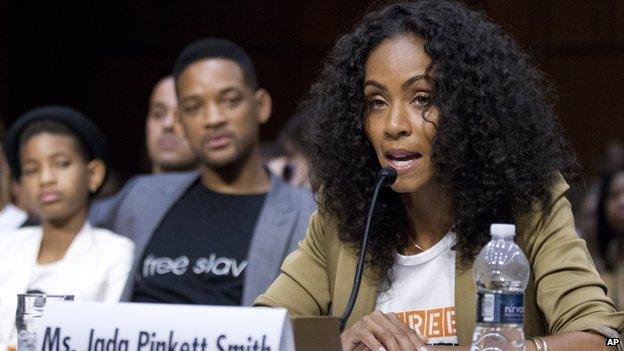Fighting human trafficking on US soil
- Published

Jada Pinkett Smith (right) says she was inspired by the research into human trafficking done by her daughter, Willow (left)
The debate over human trafficking has come to the US, and to the corridors of the US Congress, where the Senate foreign relations committee heard about crimes committed at home.
The sexual abuse started when Minh was three. When she was 11, the abuser, her father, sold Minh for sex. By 15, Minh had enough, and ran away from home, where she was subject to more rape, violence and prostitution.
It is a familiar tale to anyone familiar with the victims of human trafficking. It's also one that took place within the United States.
Minh's story was just one shared by the actress Jada Pinkett Smith, who testified in front of a Senate committee hearing focused on human trafficking internationally and domestically.
The insidiousness of human trafficking within the US was front and centre at the hearing. Senator Richard Durbin, a Democrat from Illinois, said he was frightened by the idea that people are brought as slaves to America and work "a stone's throw away from the nation's capital."
Domestic danger
The US ranks as a "Tier One" country on the State Department's Trafficking in Persons report (TIP).
<link> <caption>According to the State Department</caption> <url href="http://www.state.gov/j/tip/rls/tiprpt/" platform="highweb"/> </link> , this ranking indicates "that a government has acknowledged the existence of human trafficking, has made efforts to address the problem" and meets the minimum standards set out by the Trafficking Victim's Protection Act, a US law designed to track and report human trafficking across the world.
Nevertheless, the sale of humans for sex or labour is still a massive problem in the country.
Just this week, two Ukrainian brothers were each sentenced for sneaking men and women into the US illegally, holding them against their will, and forcing them to work as janitors. Some of the women in their capture claim they were raped.
Stepan Botsvynyuk received 20 years in prison for his role in the crime, which stretched over seven years. His brother, Omelyan Botsvynyuk, was sentenced to life in prison. The judge said the <link> <caption>severity of the brother's crimes</caption> <url href="http://articles.philly.com/2012-07-17/news/32698915_1_omelyan-botsvynyuk-extradition-treaty-ukraine" platform="highweb"/> </link> "harkened back to the Nuremberg trials".
'A lot to go'
The US is a leading destination for human trafficking, with an estimated 17,500 people brought to the country against their will. Others, like Minh, are citizens trafficked within the country's borders.
The hearing this week was an attempt to address America's role both as a leader in human trafficking outreach and the continued role it plays in hosting and attracting human traffickers.
"We've made progress, but we've got a lot to go to end this modern-day slavery," said Ben Cardin, a Democratic senator from Maryland.
As the fight against human trafficking progresses, however, so too does the strategy used by the traffickers.
"Instead of shackles and chains, traffickers use debt, coercion, fear and intimidation," said David Abramowitz, vice-president of policy and government relations for Humanity United, a non-profit organisation dedicated to advancing human freedom.
"Actions of modern day slavers include seizing travel documents, creating hidden fees that become impossible debts to pay off, and threatening police retribution or violence against family members at home if the victim tries to leave."
Fighting the law
Other challenges remain, especially for US citizens who have been trafficked since childhood. Pinkett Smith told the story of two more American women sex slaves. In each case, the police did not protect the girls - they prosecuted them.
One girl, Jamm, was sold for sex by her aunt over 100 times. "Trying to escape, Jamm stole her aunt's cell phone to try and call for help. Her aunt called the police to report the phone stolen and at age 15, Jamm was arrested and treated like a criminal," said Pinkett Smith.
Another girl was processed through the juvenile justice system 16 times over two years - and over the same period of time was being consistently beaten and sold for sex.
"It's hard to explain to law enforcement that these young ladies are not willing participants [of prostitution]. Law enforcement want the ability to treat them as perpetrators, to put them on the stand," said Florida Senator Marco Rubio, a Republican.
In a fractious political climate, it is hard to find a topic that both sides of the aisle agree on. But the idea that humans should not be held against their will is one that both Democrats and Republicans have pledged to support.
Detesting human trafficking is the easy part. Figuring out how to stop it - and finding money to do so - is much more complicated.
Just ask Minh and Jamm.
- <italic>Additional reporting by Amir Nasr</italic>
- Published19 June 2012